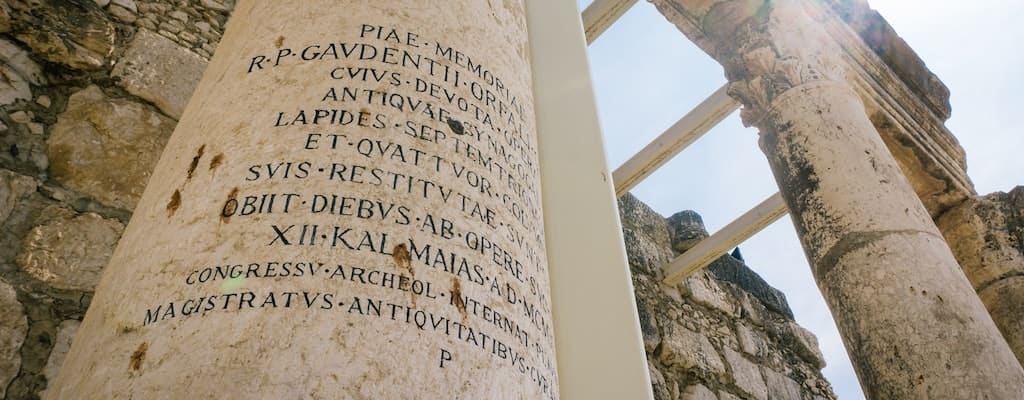Abbot’s Priory: Idiom Meaning and Origin
What does ‘Abbot's Priory’ mean?
An "Abbot's Priory" refers to something old or outdated that is no longer relevant or useful in modern times.

Idiom Explorer
The idiom "ivory tower" refers to being secluded or detached from the realities and practicalities of everyday life, often used to describe intellectuals or academics who are disconnected from the concerns of the general population.
The idiom "house of God" refers to a religious building, usually a church, mosque, or temple, where people gather to worship and practice their faith.
The idiom "Holy of Holies" refers to a sacred or highly revered place or thing, often with religious connotations. It symbolizes the utmost sanctity, purity, and importance.
The idiom "have seen one's day" means that something or someone used to be great or important in the past, but is no longer relevant or valuable in the present.
In popular culture, the idiom "has left the building" is used to indicate that someone has departed or left a place, often in a dramatic or significant manner.
The idiom *go out with the ark* is used to describe someone or something that is very old-fashioned or outdated, suggesting that they would have existed during the time of Noah and the Ark.
The idiom "good for nothing" is used to describe someone or something that is completely useless or lacking in any value or purpose.
The idiom "good old days" refers to a nostalgic longing for a past period of time that is remembered as better or more enjoyable than the present.
An idiom used to describe someone leaving or departing. It implies a physical or metaphorical departure from a place or situation.
Going away is an idiom in the English language used to describe a person's departure or leaving from a particular place. It can refer to leaving one's home, workplace, or any other location. This idiom is often used in casual conversations and can be found in various contexts.
The idiom "ghost home" refers to a property or house that is believed to be haunted or inhabited by ghosts. It implies that the place is empty or abandoned by living beings.
The idiom "ghost home" is an intriguing phrase that has multiple interpretations and connotations. While there is a lack of extensive information about this specific idiom on the internet, a few reliable sources shed some light on its possible meanings.
Unearthing Hidden Symbolism
Abbot's Priory is an idiom that dates back to the medieval period in Europe. The idiom is derived from the combination of two distinct elements - "abbot" and "priory". Both of these terms are associated with religious institutions and reflect the historical context from which the idiom emerged.
An abbot is the head or leader of a monastery or abbey, showing their authority and position of power within a religious community. A priory, on the other hand, is a smaller religious establishment that is under the authority of an abbey.
The idiom Abbot's Priory can be interpreted as a metaphor for a place of great importance or significance. It represents a space that is highly esteemed or revered, similar to the role of an abbot and the significance of a priory within the religious hierarchy. This idiom suggests that the subject being referred to holds a position of great importance, often in a specific context or domain.
For example, someone might say "John's laboratory is the abbot's priory of scientific research" to emphasize the exceptional status and significance of John's laboratory in the field of scientific research. This idiom is used to convey a sense of prestige, excellence, and reverence associated with a particular entity or endeavor.
Furthermore, the idiom Abbot's Priory can also be used to describe the notable qualities of a place, person, or thing. It suggests that the subject possesses highly regarded or exemplary characteristics, similar to the revered status of an abbot and the inherent significance of a priory.
For instance, someone might say "Her garden is a true abbot's priory, with its beautiful blooms and careful arrangement." Here, the idiom is used to highlight the exceptional beauty and meticulous organization of the garden, emphasizing its outstanding qualities and elevating it to a position of exceptional beauty and prestige.
Another related idiom is "ancient history". This phrase is often used to refer to events or situations that are considered to be in the distant past and no longer relevant. It signifies a significant amount of time has passed and the events or situations are now seen as part of the past.
When used in relation to the idiom Abbot's Priory, the phrase "ancient history" could be employed to emphasize the historical context from which the idiom emerged. It suggests that the idiom is rooted in the past and carries a sense of tradition and historical importance.
For example, one might say "The significance of this ritual may seem like ancient history to some, but it still holds great meaning in our community." Here, the phrase "ancient history" is used to highlight the historical context of the ritual and the enduring importance it holds.
Another related idiom is "bad old days". This phrase is often used to describe a period in the past that was difficult, challenging, or unpleasant. It refers to a time that is seen as negative or undesirable.
When considering the idiom Abbot's Priory, the phrase "bad old days" could be used to contrast the significance and importance of the idiom with a time that was less revered or esteemed. It suggests that the subject being referred to has moved beyond a difficult or challenging period and now holds a position of great importance.
For example, someone might say "Since those bad old days, the company has become the abbot's priory of innovation and success." Here, the phrase "bad old days" is used to reference a period of struggle or difficulty in the company's history and contrast it with their current position of significance and achievement.
Overall, the idiom Abbot's Priory embodies the historical and cultural significance of religious institutions during medieval times. Through its metaphorical usage, the idiom signifies a place or entity that holds a paramount position of importance, deserving of respect, admiration, and esteem. It serves as a powerful linguistic tool to evoke a sense of reverence, prestige, and exceptionalism. While the idiom has its roots in the religious context, its application extends beyond the realm of religion, finding relevance and significance in various domains of human experience.
Example usage
Examples:
- After working late every night, the employee's messy cubicle bore a striking resemblance to an Abbot's Priory.
- Upon entering the abandoned mansion, the eerie silence and dust-covered furniture made it feel like an Abbot's Priory.
- The overgrown garden behind the old church had become an Abbot's Priory, with vines entangled among neglected tombstones.
More "Religion" idioms

